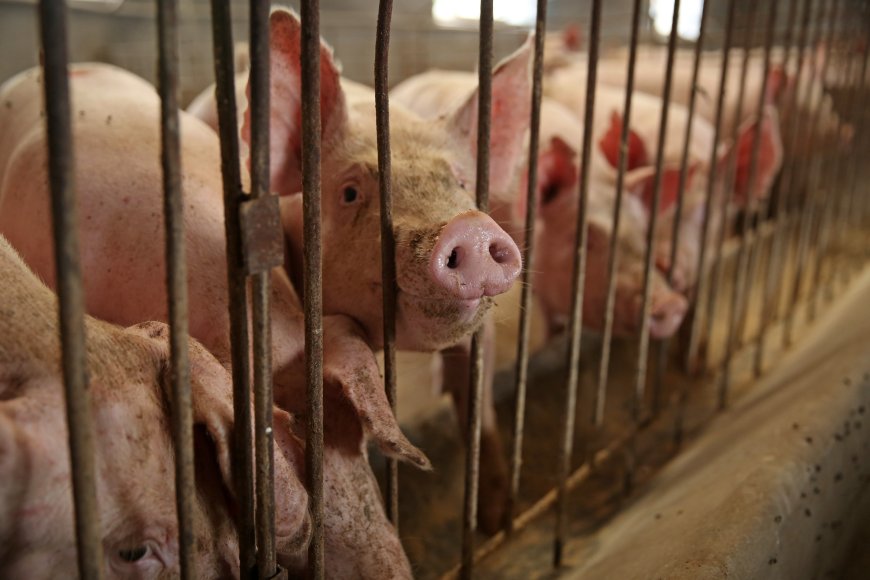Factory farming contributing to global green gases fueling climate change

Kiambu,
Thursday December 7, 2023
KNA By Wangari Ndirangu
Factory farms are contributing at least 11 percent of global greenhouse emissions fueling climate disasters, new report shows.
A report dubbed, How Factory Farming Emissions are Worsening Climate Disasters in the Global South by the World Animal Protection (WAP) details how intensive animal agriculture is impacting small-holder farming, which contributes to the livelihoods and food security of 1.7 billion people.
WAP is now calling on the ongoing COP 28 meeting in Dubai to direct adaptation, loss and damage finance towards hardest hit small holders.
Government leaders, Delegates from nearly 200 countries, leaders of business and finance, and representatives of civil society are currently attending the COP climate conference with the aim of fast-tracking the transition to a clean-energy future.
Dr. Victor Yamo, Human and Sustainable Agriculture Campaigns Manager at WAP said that factory farming releases about 11.2 to 19.6 percent of greenhouse gases, which is then leading to worsening droughts, floods, in the African context.
Speaking during the launch of the report virtually, he noted that even as factory farming continues to expand around the world due to urbanization, growing population and demand for meat, the growth comes with significant cost to climate, environment, health and to billions of animals caught up in cruel factory farms.
“By 2050, the economic costs associated with climate driven disasters globally could exceed USD1 trillion annually as the impacts of climate change intensify with factory farms which contributes to about 10 percent liable for over USD100 billion of that cost, Yamo said.
According to the report, report intensive animal agriculture is impacting small-holder farming, which contributes to the livelihoods and food security of 1.7 billion people.
WAP is calling for governments at the ongoing COP28 to impose a 10-year moratorium on new factory farms and halt this flawed food system’s rapid global expansion and also finance for adaptation and loss and damage to be directed towards smallholder farmers in the developing world.
“We need to stop supporting factory farming. We especially in the African context we are saying we need to have a moratorium on factory farming for the next 10 years so that we then drive processes around sustainable agroecological production systems that are humane and are sensitive to the animal,” he said.
Governments, he added, need to cease and stop subsidizing factory farming so that the factory farms bear the full cost of the business and ensure that that cost is, whatever is saved from the subsidies then is used to enhance and to promote sustainable, human and sustainable agroecological production systems.
“We are asking governments to develop nationally designated contributions and indices that drive the process around ensuring that agriculture and especially contribution from livestock production systems is part and parcel of the discussion around production systems to lessen climate change,” he said.
The manager continued, “World leaders must act meaningfully at COP28. They must take action to shore up a humane and sustainable food supply, with governments withdrawing subsidies for industrial meat and dairy and redirecting them to plant-based foods in ways that support small scale farmers.”
Tennyson Williams, Director for Africa at WAP said factory farming poses a core obstacle in achieving the targets laid out in the Paris Climate Agreement and casts a dark shadow over the prospect of a climate-safe future.
“As our report details, animal cruelty and climate change are interlinked. Until we get rid of animal cruelty in farming, climate change will worsen,” he said.
He explained that factory farming not only causes suffering to billions of animals and the destruction of wild habitats but it is undermining food security for communities around the world.
“Land that could be used to grow crops for humans or to protect wildlife, is instead used to plant crops to feed factory farmed animals. It’s simply a wasteful, destructive food chain,” Williams noted.
The report says that Factory farming is set to surge in the Africa, driven by an expected 30 percent rise in meat demand and this not only increase factory farming emissions and contribute to worsening climate related disasters but also replace the sustainable, agroecological pastoralists and their diversified independent farming systems.
African countries will have to spend USD53 billion annually by 2030 to adapt to the climate crisis, the report details.
According to WAP, the discussion around agriculture and sustainable agriculture needs to be part of COP 28 to ensure that the commitments that were made in 2017 around climate funding are realized so that there is money to be used tin addressing climate crisis and disasters.
Courtesy; KNA
What's Your Reaction?



































































































































































































































































































